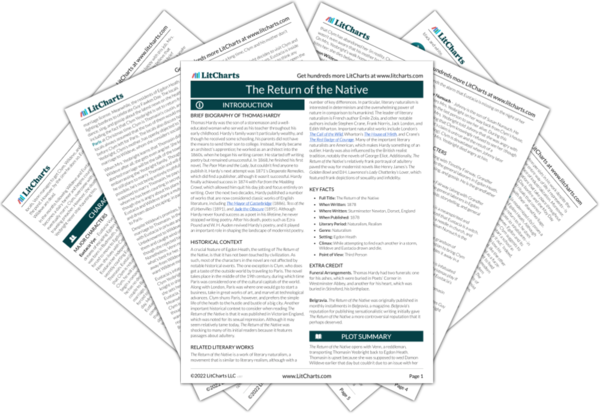One’s occupation and class are crucial factors when considering marriage proposals on Egdon Heath. Much of the drama of the first half of the novel revolves around Mrs. Yeobright’s feelings that her son, Clym, and her niece, Thomasin, are not marrying people who are of a high enough social standing. Mrs. Yeobright’s displeasure with Thomasin and Wildeve’s marriage leads Wildeve back to Eustacia. Meanwhile, her problem with Clym and Eustacia’s marriage drives a permanent wedge between herself and her son. However, a peculiar feature of Mrs. Yeobright’s character is that she actually married a dairy farmer who would’ve been below her rank in the social hierarchy, at least according to Captain Vye. It is unclear whether she is being hypocritical or if she just doesn’t want her relatives to make the same mistake that she did. Of course, though Mrs. Yeobright’s classism is responsible for many issues in the novel, she also ends up being correct about her relatives’ marriages, as both start and end in disasters.
However, The Return of the Native does not go so far as to reward Mrs. Yeobright’s classist attitude. In fact, it shows how a single-minded focus on wealth and social status can be harmful. Eustacia, for instance, manipulates and betrays her lovers throughout the book: she chooses Wildeve over Venn because he’s of a higher social class, but then she abandons Wildeve for Clym because she (falsely) believes that Clym can give her a refined Parisian lifestyle. Another example of this sort of moral corruption happens toward the end of the book, when Wildeve inherits a fortune from a deceased relative. However, his sudden acquisition of wealth does not make him more virtuous, nor does it make him treat Thomasin any better. If anything, his money makes him more of a problem, because he now feels justified in keeping Thomasin as his wife and Eustacia as his mistress. As such, The Return of the Native ultimately argues that wealth is a useful tool, but not one that is synonymous with virtue.
Class and Morality ThemeTracker

Class and Morality Quotes in The Return of the Native
The only intelligible meaning in this sky-backed pantomime of silhouettes was that the woman had no relation to the forms who had taken her place, was sedulously avoiding these, and had come thither for another object than theirs. The imagination of the observer clung by preference to that vanished, solitary figure, as to something more interesting, more important, more likely to have a history worth knowing than these newcomers, and unconsciously regarded them as intruders. But they remained, and established themselves; and the lonely person who hitherto had been queen of the solitude did not at present seem likely to return.
“As a matter of justice it is almost due to me,” said Wildeve. “Think what I have gone through to win her consent; the insult that it is to any man to have the banns forbidden—the double insult to a man unlucky enough to be cursed with sensitiveness, and blue demons, and Heaven knows what, as I am. I can never forget those banns. A harsher man would rejoice now in the power I have of turning upon your aunt by going no further in the business.”
Eustacia Vye was the raw material of a divinity. On Olympus she would have done well with a little preparation. She had the passions and instincts which make a model goddess, that is, those which make not quite a model woman. Had it been possible for the earth and mankind to be entirely in her grasp for a while, she had handled the distaff, the spindle, and the shears at her own free will, few in the world would have noticed the change of government. There would have been the same inequality of lot, the same heaping up of favors here, of contumely there, the same generosity before justice, the same perpetual dilemmas, the same captious alteration of caresses and blows that we endure now.
“There is no chance of getting rich. But with my system of education, which is as new as it is true, I shall do a great deal of good to my fellow-creatures.”
“Dreams, dreams! If there had been any system left to be invented they would have found it out at the universities long before this time.”
It was bitterly plain to Eustacia that he did not care much about social failure; and the proud fair woman bowed her head and wept in sick despair at thought of the blasting effect upon her own life of that mood and condition in him. Then she came forward.
“I would starve rather than do it!” she exclaimed vehemently. “And you can sing! I will go and live with my grandfather again!”
“Yes, I fear we are cooling—I see it as well as you,” she sighed mournfully. “And how madly we loved two months ago! You were never tired of contemplating me, nor I of contemplating you. Who could have thought then that by this time my eyes would not seem so very bright to yours, nor your lips so very sweet to mine? Two months—is it possible? Yes, ’tis too true!”
He left alone creeds and systems of philosophy, finding enough and more than enough to occupy his tongue in the opinions and actions common to all good men. Some believed him, and some believed not; some said that his words were commonplace, others complained of his want of theological doctrine; while others again remarked that it was well enough for a man to take to preaching who could not see to do anything else. But everywhere he was kindly received, for the story of his life had become generally known.
















